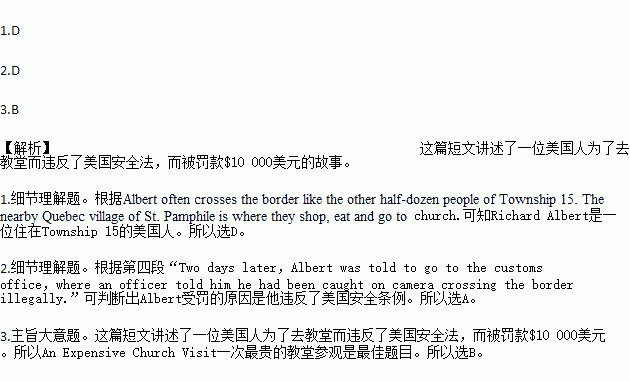题目内容
MONTREAL(Reuters)—Crossing the US-Canada border to go to church on a Sunday cost an American $10,000 for breaking Washington’s strict new security rules.
The expensive trip to church was a surprise for Richard Albert, who lives right on the Canadian border. Albert often crosses the border like the other half-dozen people of Township 15. The nearby Quebec village of St. Pamphile is where they shop, eat and go to church.
There are many such situations in these areas along the largely unguarded 5,530-mile border between Canada and the US, which in some cases actually runs down the middle of streets or through buildings.
As a result, Albert says he did not expect any problems three weeks ago when he returned home to the US after attending church in Canada, as usual. The US customs station in this area is closed on Sundays, so he just drove around the locked gate, as he had done every weekend since the gate appeared last May, following a tightening of border security. Two days later. Albert was told to go to the customs office, where an officer told him he had been caught on camera crossing the border illegally.
Ottawa has given out special passes to some 300 Americans in that area so they can enter the country when Canadian customs(海关) stations are closed, but the US stopped a similar program last May. That forces the people to a 200-mile detour along hilly roads to get home through another border checkpoint.
Albert has requested that the customs office change their decisions on the fine, but he has not attended a Sunday church since. “I feel like I’m living in a prison,” he said.
1.We learn from the text that Richard Albert is .
A. an American working in a Canadian church
B. a Canadian living in a Quebec village
C. a Canadian working in a customs station
D. an American living in Township 15
2.Albert was fined because he .
A. broke the American security rules
B. failed to obey traffic rules
C. worked in St. Pamphile without a pass
D. damaged the gate of the customs office
3.What would be the best title for the text?
A. A Cross-country Trip B. An Expensive Church Visit
C. An Unguarded Border D. A Special Border Pass
 备战中考寒假系列答案
备战中考寒假系列答案
